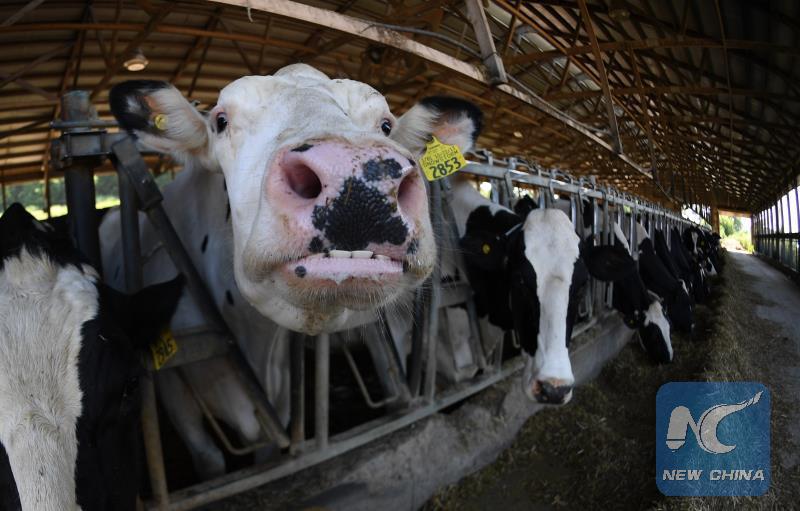
Photo taken on July 24, 2018 shows cows raised in Neldell farm in Winsconsin, the United States. (Xinhua/Liu Jie)
by Xinhua writers Liu Chen, Hu Yousong
WASHINGTON, Aug. 2 (Xinhua) -- Next year will mark the 100th anniversary of her dairy farm, Sarah Lloyd, a dairy farmer from the midwest United States, told Xinhua recently. Yet she seemed to be devoid of the confidence that usually comes with such a milestone.
"If we don't see any kind of light at the end of the tunnel soon, I can't imagine what will be milking cows next year," the 46-year-old said.
Despite having suffered from stubbornly low milk prices for years, the Neldell farm, a private business established by the family of Lloyd's husband, was doing better for a while as the market showed signs of recovery.
But the unexpected trade disputes initiated by the Trump administration have dealt a big blow to the U.S. dairy industry, and diminished hopes of survival for this medium-sized century-old farm.
"We're entering a frightening trade war period," Lloyd said. "We're really struggling."
LAST STRAW?
"My husband's family has been milking cows for over 100 years," said Lloyd. "Next year will be the 100th year at this place."
The Neldell farm, located in rural Dells of the north-central U.S. state of Wisconsin, was established by the grandfather of Sarah's husband, Nels Nelson. In 2002, with confidence in the future of the milk market, the Nelson family doubled the number of their herd from 125 to 250 cows and built a new dairy barn among other facilities.
"Things are going pretty good except it's harder to make money," said Nelson, a third-generation farmer.
"The problem is our cost has really risen for the last couple of years, and the margin has got smaller and smaller," the 53-year-old said.
U.S. milk prices have been on a downward spiral after a peak in 2014 for over 25 U.S. dollars a hundredweight (or per 453.6 kg), mainly due to over-production and shrinking domestic consumption. Afterwards, the price once climbed to about 19 dollars a hundredweight in early 2017, but slumped this year to as low as 16 dollars.
The industry was barely starting to recover when the tariffs came, Mark Stephenson, director of dairy policy analysis at the University of Wisconsin, told Xinhua. "So farms are now looking at another period of time with low prices," he said.
As trade frictions flared up due to Washington's widely-condemned tariffs on multiple imports, some of U.S. dairy products' key export markets retaliated with extra tariffs, resulting in a significant drop in milk prices in the United States.
For Nelson's farm, it could possibly be the last straw, pushing the long struggling family closer to the brink of ending their dairy business.
Lloyd said the farm is currently paid around 16 to 17 dollars per hundredweight of milk, while what they needed was at least 18 or 19 dollars to break even.
"We're probably losing about 30,000 dollars a month right now," the co-owner of the farm said. "We have to figure out a way to pay down our debts."
WHAT'S NEXT?
"It's really bad right now and we're not alone," said Lloyd. "It's really impacting everyone in the dairy industry."
Statistics showed that in 2007 there were over 14,000 dairy farms in operation in Wisconsin, a state nicknamed "America's Dairyland," but the number has shrunk to around 8,500 so far this year.
"We've been on a pretty steady decline, but it's escalating," Lloyd said.
"At this very moment ... what we are going to lose is a lot of farmers," Jaime Castaneda, senior vice president of the U.S. Dairy Export Council, told Xinhua in a recent interview.
What's even worse was that few choices are left for dairy farmers.
"It's not good to be a soybean or corn farmer right now either," Lloyd said. "Those prices are so low and they are also being impacted probably more so by tariffs and trade disputes."
Soybean and corn prices have fallen by roughly 20 percent since Washington's tariffs have been met with retaliation, adding misery to many farmers growing the crops.
Under such circumstances, "maybe some farmers just decide that it's time for me to retire, go out of business," said Stephenson, who has been in the dairy industry for over 30 years.
"We've seen a little bit more of that happening too. That's an unfortunate side effect," Stephenson said.
For Nelson, who has been working on his farm for decades, quitting the dairy business would be a harsh decision to make, though his father had suggested he do so.
"His view is to cut our losses and quit milking now ... before we may lose more money," Nelson said.
But the dairy farmer found it difficult to bid farewell to the cows. "You know the cows ... when you work with them all the time. That could make it kind of hard," he said.
Meanwhile, Lloyd has already begun to plan for their future. "We would live off my income and then we would sort of regroup," said Lloyd, who is currently also working as a special projects coordinator for the Wisconsin Farmers Union and the director of development for the Wisconsin Food Hub Cooperative.
Nelson said he had a dairy farmer friend who was one year his junior. This friend had already decided to retire due to the dim prospects for the industry.
"It's probably time for me to consider that too," the veteran farmer said.

